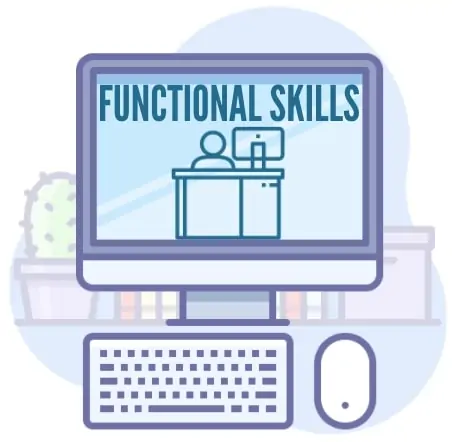“What Are Functional Skills?” And 17 Examples That Managers Love


So what are functional skills?
Put plainly, functional skills are taking the foundational concepts you learned in school – math, English, computer science – and applying them to real-life problems and work scenarios.
In the work context, they’re also called competencies. In everyday life, people might use life skills or social skills instead of functional skills.
Functional skills tend to be relevant across various work settings and are crucial for any job seeker to develop, especially when applying for a new role or entering a new industry.
The functional skills in this article are the most commonly sought-after skills that employers and hiring managers desire their workers to have. Increasing your skill level over time will often decide your career path.
For a quick summary, here are 17 examples of what a functional skill is:
- 1. Math Skills
- 2. Monitor and Manage Systems
- 3. Arrange and Retrieve Data
- 4. Categorize and Summarize Data
- 5. Facilitate Discussion
- 6. Public Speaking
- 7. Write, Edit and Summarize
- 8. Languages
- 9. Research
- 10. Use of Writing/Office Programs
- 11. Create Visual Presentations
- 12. Online Scheduling
- 13. Scheduling Staff
- 14. Facilitate Meetings
- 15. Develop Policies
- 16. Manage Team Compliance
- 17. Create Feedback Systems
17 Examples Of Functional Skills That Managers Love
Managing Information Functional Skills

One of the essential functional skills categories is managing information. This means working with data points, whether numerical or written text, in systems and through set procedures, to effectively manage key information related to your role.
1. Math Skills
Basic maths skills are considered a core functional skill in entry-level administrative, data entry, and management roles in finance and business.
Addition, subtraction, percentages, multiplication, and other mathematical skills are the most basic and common skills expected of most job-seekers.
When applying for analytical roles, be sure to express your proficiency level in mathematics to show that you have this functional skill. Often listing within your higher education degree will do.
Recommended Course: Foundations of Mathematics (Brilliant)
2. Monitor and Manage Systems
In an increasingly digital world, having a capability in information management – experience monitoring and overseeing different basic systems – is ideal for supervisor and management roles.
An example of this would be the skill of overseeing the internal systems of holding and sending inventory, which may be used in a warehouse back-end environment.
Systems management is varied, so when you list your functional skill qualifications, it is always best to give specific examples.
3. Arrange and Retrieve Data
Since many administrative roles require the ability to work with different data, whether client information, numerical data points, or sales data. Being able to track, interpret, and organize data, is a vital functional skill.
State that this is a skill that you have on your CV, and then elaborate with examples of how you used it in your previous role/s.
Recommended Course: Learning Data Analytics (LinkedIn Learning)
4. Categorize and Summarize Data
Similar to the point above, this is another common information management skill.
This functional skill is a little deeper into the organization of data, in taking the creative initiative to be able to categorize data points and summarize key information to share with other divisions, and levels of management.
When applying for your next job, express your proficiency level in categorizing and summarising data to show that you are adept at this functional skill.
Communication and Interpersonal Functional Skills

Communication and interpersonal skills are some examples of the most important functional skills for any employee since business happens among people – verbal or written communication. The following skills are examples that may be relevant to put on your resume.
5. Facilitate Discussion
Managing groups of people through productive conversations – such as in meetings within a team or between organizations – is an advantageous skill area for a prospective employee.
Facilitating discussion involves taking authority in a social situation to ask questions, lead talking points, model teamwork, and display leadership skills.
If you have experience in this form of communication, be sure to add it to your resume with real-life context.
6. Public Speaking
Public speaking can be a great functional skill whether to deliver presentations, speak to teams, organizations, or in networking environments.
When a worker has experience in public speaking and a level of confidence, this is highly advantageous since most people find public speaking difficult.
It’s important to state on your CV that you have this experience and interest, as it is highly desirable for many industries and roles.
Recommended Course: Public Speaking Foundations (LinkedIn Learning)
7. Write, Edit and Summarize
Written communication is a necessary critical thinking skill for almost all industries and roles – whether simply in being clear in emails, or working on internal and external written content.
The ability to also edit documents, with high proficiency in grammar and punctuation, as well as summarising key points, is beneficial.
If you’re applying for an admin role or require creating and managing documents, write this as a functional skill on your resume.
Recommended Course: Business Writing Fundamentals (LinkedIn Learning)
8. Languages
When a prospective employee has the ability to speak, read, and/or write in multiple languages, this can be extremely helpful.
State which languages you can speak, read, and write in to be sure that the potential employer understands that you have this functional skill.
Information and Technology Functional Skills

Since so much of our work is now done using various devices and online portals, information, and technology functional skills are some of the most desirable for almost all roles now more than ever.
9. Research
Whether researching for internal operation development, or market research, for example, the ability to search for relevant information is desirable.
Knowing how to research effectively means a good sense of keyword searching, knowing the right databases, and understanding how best to use the time to look for the information needed.
If you have specific research experience, share examples of how you have undertaken different research in the past.
10. Use of Writing/Office Programs
It’s almost a given that every person applying for a job can use basic writing programs like Microsoft Word or Google Docs.
More advanced skills in an office suite, such as proficiency in Microsoft Excel or Google Sheets, will give you a leg up over the competition.
It may seem commonplace for everyone to be able to use these common office software applications, though not everyone has this skill. Don’t forget to list it on your resume.
Recommended Course: Microsoft Word Bootcamp (Skillshare)
11. Create Visual Presentations
For companies that have a workflow where presentations are common, the ability to create visual graphics, and layouts for presentations is beneficial. There are typically done in Microsoft PowerPoint.
Consider joining a company where they hold presentation meetings on a weekly basis, and you have the skill to create these for your work or your team’s presentations.
If you can create and design presentations, definitely list this as a functional skill on your CV.
Recommended Course: PowerPoint For Beginners (Skillshare)
12. Online Scheduling
This is also a management skill, as scheduling calls, appointments, and tasks are necessary for any supervisor or managerial role.
Additionally, administrative roles would prefer that you have the skill of using scheduling apps, like Calendly or Google Calendar, to keep track of clients and tasks.
List which apps you have proficiency in, and how they were utilized in your past role/s when you create your resume.
Leadership Functional Skills

Finally, for higher-level roles, examples of functional skills for leadership will be required for any supervisor or managerial role. Even still, any role level would still benefit from expressing that you have critical thinking and problem-solving skills since it bodes well for future career advancement.
13. Scheduling Staff
Rather than just having a good idea of how to use scheduling apps and software, scheduling staff is a deeper management skill as it involves stepping up in leadership to make decisions.
This skill requires the person to understand labor costs, demand, time management, and more, so when you have scheduling staff as a functional skill, you’ll be seen as a desirable potential employee.
How long did you have this task, and how many team members were you responsible to schedule? Be sure to put this detail on your CV.
14. Facilitate Meetings
This one also utilizes the communication skill of facilitating discussion and leading the flow of ideas, asking questions, and having a higher-level view of the overall goals and outcome.
If you have experience facilitating meetings, this will give you an advantage as it is a key leadership skill.
Don’t forget to add this functional skill to your resume with examples.
15. Develop Policies
It’s one thing to follow policies and procedures, and it’s another thing to develop them. The leadership functional skill of developing policies shows that you have had experience being entrusted with responsibility.
This reveals that you held a role that had a considerable need to problem solve and organize systems in a way that will support a company’s efficiency and growth.
On your CV, list what kind of policies and procedures you have developed, what problems they solve, and your overall sense of how they benefited your past role.
Recommended Course: Establishing Work From Home Policies (LinkedIn Learning)
16. Manage Team Compliance

When leading a team, it’s important to ensure that you have a strong ability to monitor whether the team is compliant with policies and procedures.
Every business has its own set of standards and rules to abide by; if the team isn’t kept in check by someone, it can be ineffective.
If you were the one to manage the team’s compliance in the past, share this on your resume.
17. Create Feedback Systems
Finally, leading a team also requires the ability to check in with how they are faring, and to empower them to add their own two cents to the role in the form of feedback.
Whether a feedback system is through regular email surveys, a feedback box, or meetings, if you can create these systems, this is advantageous for you when applying for future roles.
As the driving force behind the company is the employees, developing rapport and a strong team is desirable for employers, so be sure to state that you have this skill on your CV if you have the experience.
Recommended Course: Grow Yourself & Your Team With Skilled Feedback (Skillshare)
Where Should I add Functional Skills on my Resume?
There are different ways to add functional skills to your resume.
A common method is to create a separate section that lists your functional skills above your work experience list. You can categorize the skills similar to what we have here in this article; for example, having Information technology as a header and then multiple IT skills and examples from your past roles.
Another way is to add each of your functional skills as bullet points at the bottom of each section of your past roles. So after you explain the company you last worked for and what the role entailed, you could then add a functional skills list below of what key skills were practiced in that role. You would do this for each role respectively.
Whichever way you choose to add your functional skills, be sure not to forget this on your resume, as it may very well be the difference between you being hired over someone else in your next job application.
Do Functional Skills Mean Something Else In The UK?
Yes. Functional skills are GCSE alternative qualifications, with a Level 2 Functional Skills course equating to a GCSE grade 4. So while similar in what they represent, they carry a specific distinction in England.
According to LearnDirect, the designation was “introduced in 2007 to boost the UK’s literacy and numeracy, Functional Skills qualifications were developed to upskill the nation’s workforce. Since then, NCFE Functional Skills qualifications have offered thousands of people the key skills they need for life.”
Core subjects include English, Maths and Functional Skills ICT (Information & Computer Technology). As a credential, these skills assessments can replace the GSCEs for learners who didn’t complete their school previously but want to demonstrate proficiency in these essential life skills.
References
- https://novoresume.com/career-blog/most-important-skills-to-put-on-your-resume
- http://s.wsj.net/public/resources/documents/JOBHUNT_skills_ws.pdf
- https://careertrend.com/how-4795096-describe-selfmanagement-skills-resume.html
- https://www.indeed.com/career-advice/resumes-cover-letters/functional-skills-definition
